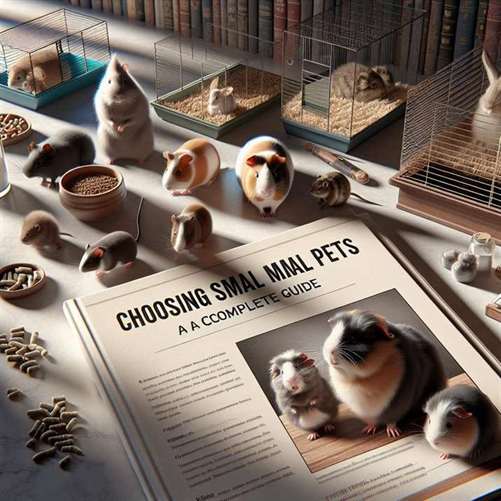Choosing Small Mammal Pets: A Complete Guide
Introduction
Are you considering adding a small mammal to your family? Choosing small mammal pets can be an exciting journey that brings joy, companionship, and a host of benefits. With their unique personalities and manageable care requirements, small mammals have become increasingly popular among pet lovers. According to recent studies, the trend of adopting small mammals is on the rise as people seek more space-efficient and low-maintenance companions.
In this guide, we’ll explore everything you need to know about choosing small mammal pets. From understanding their care needs to identifying the most suitable breeds for your lifestyle, this article will provide you with valuable insights. By the end, you’ll be equipped with the knowledge necessary to make an informed decision about which small mammal might be the perfect addition to your household.
Whether you’re a seasoned pet owner or a first-time buyer, this guide will help you navigate the world of small mammals. We’ll cover the benefits of having small pets, how to choose the right one, and tips for their care. So, let’s dive in and discover how choosing small mammal pets can enrich your life!
For further insights into pet care, be sure to discover more small animal care tips.
What is Choosing Small Mammal Pets?
Definition
Choosing small mammal pets refers to the process of selecting small mammals, such as hamsters, guinea pigs, rabbits, and ferrets, as companions. These pets are typically characterized by their compact size, diverse breeds, and varying temperaments, making them suitable for various living situations, including apartments and homes with limited space.
Historical Context
Historically, small mammals have been kept as pets for centuries. While dogs and cats have long been the stars of the pet world, small mammals have gained traction over recent decades. In the 1970s and 1980s, small pets began appearing in households across the globe, largely due to their ease of care and lower maintenance costs compared to larger animals.
As society evolved, so did the perception of small mammals. They shifted from being merely “exotic” pets to beloved family members. Today, choosing small mammal pets is not just a trend; it’s a lifestyle choice for many families looking for gentle, affectionate companions that don’t require as much space or time as traditional pets.
The Importance of Choosing Small Mammal Pets
The growing interest in small mammal pets can be attributed to several factors:
- Space Efficiency: Small mammals require less space than dogs or cats, making them ideal for urban dwellers.
- Affordability: Generally, the cost of care for small mammals is lower, including food, housing, and veterinary bills.
- Low Maintenance: Many small mammals have simple care needs, making them suitable for busy individuals or families.
- Variety: With numerous species and breeds available, pet owners can choose a small mammal that fits their lifestyle and personality.
Choosing Small Mammal Pets in the Context of Veterinary Care
Veterinary care for small mammals has also advanced significantly. Veterinarians are now better equipped to handle the unique needs of these pets, including specialized diets and health concerns. Regular check-ups and preventive care are essential for ensuring the health and happiness of your small mammal.
Key Players or Contributors
The rise in popularity of small mammal pets has led to the establishment of organizations and communities dedicated to their care and welfare. Many pet stores and nonprofits provide resources for prospective owners, ensuring they understand the responsibilities involved in choosing small mammal pets.

Benefits of Choosing Small Mammal Pets
The advantages of having small mammals as pets are plentiful. Here’s a closer look at some of the key benefits:
- Companionship: Small mammals can form strong bonds with their owners, offering companionship and affection.
- Educational Opportunities: They can teach children about responsibility and empathy through daily care routines.
- Stress Relief: Interacting with pets has been shown to reduce stress and promote mental well-being.
- Low Noise Levels: Most small mammals are relatively quiet compared to dogs and cats, making them great for apartments.
How to Choose the Right Small Mammal Pet
Choosing the right small mammal pet involves considering various factors to ensure a good match for your lifestyle. Here are some essential steps to guide you:
Assess Your Living Situation
Before you decide, evaluate your living environment. Do you have enough space for a cage or enclosure? Is your home pet-friendly? Consider the following points:
- Size of the Pet: Ensure you select a small mammal that is appropriate for your living space. Some, like guinea pigs, require more room than others.
- Cage Requirements: Research cage sizes and setups for different small mammals to determine what fits best in your home.
Understand Care Requirements
Different small mammals have various care needs. Familiarize yourself with the following aspects:
- Diet: Research what food is best for your chosen small mammal. For instance, guinea pigs require vitamin C in their diet, while hamsters thrive on a mix of seeds and pellets.
- Social Needs: Some small mammals, like rabbits, are social creatures and do better in pairs, while others, like hamsters, are solitary.
Consider Your Lifestyle
Your daily routine will significantly impact your choice of small mammal. Think about:
- Time Commitment: Some small mammals require more interaction and playtime than others. Ensure you have the time to dedicate to their social needs.
- Allergies: If you or someone in your household has allergies, consider smaller mammals that are less likely to trigger reactions, such as certain breeds of guinea pigs.
Research Popular Small Mammal Pets
Here’s a quick overview of some popular small mammals you might consider:
- Guinea Pigs: Known for their friendly nature, they require ample space and companionship.
- Hamsters: Ideal for beginners, hamsters are low-maintenance but need a secure cage to prevent escapes.
- Rabbits: Social and affectionate, rabbits need ample space to hop and explore.
- Ferrets: Playful and curious, ferrets require a lot of interaction and playtime.
For a deeper dive into specific breeds, check out our guide on the most popular small mammal pets to own.
Care Tips for Small Mammal Pets
Once you’ve chosen your small mammal, understanding how to care for them is crucial for their well-being. Here are some essential care tips:
Proper Housing
Choosing the right habitat is vital. Ensure the cage size is appropriate for your pet. For example, larger breeds like rabbits need spacious cages with room to hop around. Use bedding that is safe and comfortable, such as aspen shavings or paper-based bedding.
Nutrition
Feeding your small mammal a balanced diet is essential. Here’s a quick overview of dietary needs:
- Guinea Pigs: Fresh hay, vegetables, and specially formulated pellets.
- Hamsters: A mix of seeds, pellets, and occasional fruits or veggies.
- Rabbits: Unlimited hay, fresh veggies, and limited pellets.
For specific food recommendations, refer to what small mammal pet food should you buy.
Health Care
Regular vet check-ups are vital to monitor your small mammal’s health. Be vigilant for signs of illness, such as changes in eating habits or lethargy. Vaccinations and preventive care can help maintain their health.
Enrichment and Socialization
Small mammals thrive on social interaction and mental stimulation. Provide toys and activities to keep them engaged. Regular playtime outside their cage is also essential for their physical and mental well-being.
Future Trends in Choosing Small Mammal Pets
As trends evolve, the landscape of choosing small mammal pets continues to change. Here are some future trends to watch:
Increased Awareness of Animal Welfare
Pet owners are becoming more educated about the needs of small mammals. This includes understanding their social structures, dietary requirements, and overall welfare. As a result, more pet owners are making informed decisions when adopting.
Sustainable Pet Ownership
With a growing emphasis on sustainability, many pet owners are looking for eco-friendly products and practices. From sustainable bedding options to organic foods, the small mammal pet industry is adapting to meet these needs.
Innovations in Pet Care
The pet care industry is witnessing innovations, such as smart pet products that help monitor health and well-being. These advancements can assist owners in better understanding their pets’ needs.
Conclusion
Choosing small mammal pets can be a rewarding and fulfilling experience. With their unique personalities and relatively low maintenance, small mammals offer companionship that can enrich your life. By understanding the care requirements and conducting thorough research, you can make an informed decision that benefits both you and your future pet.
Remember, the journey of choosing small mammal pets is just the beginning. Embrace the joy of pet ownership, and ensure you provide the love and care these delightful creatures deserve. For more tips on small mammal care, don’t hesitate to explore our extensive resources, including our complete guide to small mammal pet care.
Happy pet parenting!
Resource Links:
- jakes-bones.com: The beetles are really good at very small animals because they leave just enough flesh for the skeleton still to be connected. For larger animals, a lot of the …
- wsava.org: … help guide ingredient selection and nutrient levels. 3. What … © World Small Animal Veterinary Association (WSAVA) 2021. All rights …
- humanesociety.org: Some people might consider hamsters, guinea pigs and other small mammals as “starter” pets: tools to teach responsibility to their children, …




0 Comments